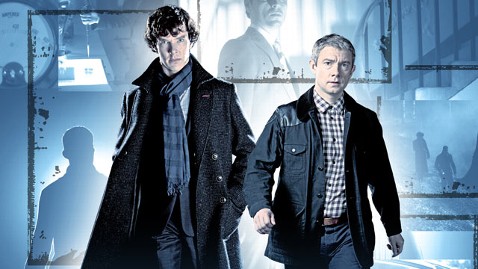'Sherlock' Shines on PBS

"Sherlock" Series 2 (Credit: BBC for Masterpiece)
It's not your parents' Sherlock Holmes.
"Sherlock," which returns to PBS Sunday for a second season, has all the hallmarks of a U.K.-to -America TV import: Classic story: check. Impeccable acting: check. Period costumes: check - sort of.
Co-created by Mark Gatiss and Steven Moffat (also the show-runner for "Dr. Who"), "Sherlock" is both an adaptation and a modern update. Gone are the Victorian clothes, the horses and carriages, and the genial but bumbling Dr. Watson. Instead we get text-messaging, Skyping, and a blogging Watson (Martin Freeman) with the spirit and wit to match his famous comrade in arms.
Best of all, we get Sherlock, played with great panache by actor Benedict Cumberbatch. This Sherlock is still brilliant, and still cold, but with rough edges. This isn't Basil Rathbone's Sherlock or even Robert Downey Jr.'s. This Sherlock still has some growing up to do.

Sherlock is played by Benedict Cumberbatch (Credit: Lisa Bernier)
In a joint interview earlier this week, Moffat and Cumberbatch talked about the evolution of the character from series one to the latest episode. Sipping on coffee (Cumberbatch) and a Diet Coke (Moffat), the two ruminated on how Sherlock has evolved.
"This is the young Holmes, this is the beginning," said Moffat.
Cumberbatch said, "He knows how to solve a puzzle. Everyone is just pieces and there is nothing to care about. What happens during this series is that you realize he probably wasn't always like the Holmes we first meet."
The challenges thrown at Sherlock are sourced from the three most famous stories in the Holmes canon: "A Scandal in Bohemia," "The Hound of the Baskervilles," and "The Final Solution." Or, as Moffat succinctly put it, Sherlock grapples with "The Woman, the Hound, and the Fall."
"[The things] he faces are so final and ultimate that he has to slightly deconstruct his game plan and reexamine who he is and how he has become what he is," Cumberbatch said. "And it's done very subtly, and it's done through interchanges where he does realize people's feelings are hurt…It's actually a byproduct of him having cut that sensor off, but those filters start to come back a bit and he's a stronger hero for it."
Anyone familiar with Moffat's work on The BBC's "Dr. Who" knows he tries to keep it open to all audiences.
"You shouldn't be kicking anyone out of the audience. If it appeals to everyone, how is that a disadvantage?" he said. Moffat also objects to using obscenities. "I've reached the conclusion that swearing is just bad writing," he said. "If you can't make the line work without the swear word, you haven't got the line right."
If the success of the first season is any indication, it appears Moffat's strategy is working. When it premiered in the U.S., it was received with general critical acclaim.
David Rooney of The Hollywood Reporter wrote, "Detective stories are nothing without meticulous exposition, and this one dazzles with the economy of its character presentation, its witty groundwork for the central relationship and the diabolical glee with which it lays out pieces of the puzzle at hand."

Benedict Cumberbatch & Steve Moffat answer fans (Credit: Lisa Bernier)
Moffat has successfully created a show that opens itself up to anyone willing to give it a try. Fans young and old have embraced "Sherlock" to the surprise and delight of all those involved. "When we wrote that cliffhanger, we didn't know there would be a second series, we didn't know it would be a hit," Moffat said about the season one finale. There will be more thrills to come this season.
"We had to think of what was the most surprising next thing to happen and I think we got that," Moffat said. "I don't think anyone saw exactly what was going to happen next."
"Sherlock" Series 2 begins on "Masterpiece Mystery" on Sunday, May 6 on PBS.